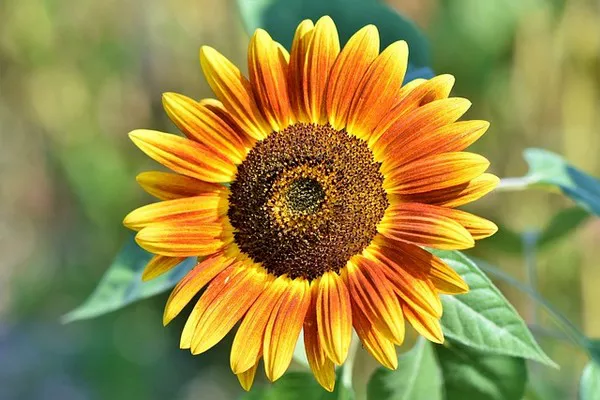Sunflowers are renowned for their bright, cheerful blooms and the promise of nutritious seeds. However, sometimes sunflowers fail to produce seeds, leaving gardeners puzzled and disappointed. Understanding the reasons behind this issue is crucial for cultivating healthy sunflowers and maximizing seed production. In this article, we delve into the various factors that can contribute to sunflowers not producing seeds and provide practical solutions for ensuring a successful harvest.
Sunflower Seed Production
Sunflowers (Helianthus annuus) are not only prized for their aesthetic appeal but also for their valuable seeds, which are rich in nutrients and oil. These versatile plants are cultivated worldwide for both ornamental and agricultural purposes. Sunflower seeds are used in cooking, pressed for oil, and provide a nutritious snack.
The life cycle of a sunflower begins with the germination of seeds, followed by vegetative growth, flowering, pollination, and seed development. Successful seed production relies on various factors, including environmental conditions, pollination, soil quality, and plant health. When any of these factors are compromised, sunflowers may fail to produce seeds, leading to barren flower heads.
Common Reasons for Sunflowers Not Producing Seeds
1. Poor Pollination: Sunflowers are typically pollinated by bees and other insects attracted to their bright flowers. Insufficient pollination can occur due to a lack of pollinators, adverse weather conditions, or poor flower structure. Inadequate pollination results in empty or partially filled seed heads.
2. Lack of Sunlight: Sunflowers require ample sunlight to thrive and produce seeds. Insufficient sunlight can stunt growth and reduce flowering, ultimately affecting seed development. Plant sunflowers in a location with full sun exposure for optimal growth and seed production.
3. Nutrient Deficiency: Sunflowers require essential nutrients, including nitrogen, phosphorus, and potassium, for healthy growth and seed production. Soil deficiencies or imbalances can inhibit flower development and seed formation. Conduct a soil test to identify nutrient deficiencies and amend the soil accordingly with organic fertilizers or compost.
4. Water Stress: Inconsistent watering or drought conditions can stress sunflowers and disrupt seed development. Adequate moisture is crucial, especially during flowering and seed formation stages. Water sunflowers deeply and regularly, ensuring the soil remains consistently moist but not waterlogged.
5. Pest and Disease Damage: Pests such as aphids, thrips, and birds can damage sunflower plants and hinder seed production. Additionally, diseases such as downy mildew and powdery mildew can affect plant health and reduce seed yield. Implement pest management strategies, such as regular inspection and treatment with organic pesticides, to protect sunflowers from damage.
6. Genetic Factors: Some sunflower varieties are bred specifically for ornamental purposes and may produce fewer seeds compared to traditional seed-bearing varieties. When selecting sunflower seeds for planting, choose varieties known for their seed production capabilities.
7. Environmental Stressors: Extreme temperatures, high winds, and other environmental stressors can impact sunflower growth and development. Plant sunflowers in sheltered locations and provide adequate support to prevent wind damage.
8. Improper Plant Spacing: Overcrowded sunflowers may compete for resources, resulting in reduced seed production. Follow spacing recommendations for the chosen sunflower variety to ensure sufficient room for growth and development.
Solutions for Maximizing Sunflower Seed Production
1. Promote Pollinator Activity: Attract pollinators to the garden by planting companion flowers such as marigolds, cosmos, and zinnias. Avoid using pesticides that harm beneficial insects, and provide nesting sites for native bees.
2. Optimize Growing Conditions: Ensure sunflowers receive at least 6-8 hours of direct sunlight daily. Prepare well-draining soil rich in organic matter and maintain proper soil moisture levels throughout the growing season.
3. Provide Nutrient-Rich Soil: Amend soil with compost or aged manure to improve soil fertility and structure. Supplement with organic fertilizers as needed based on soil test results to correct nutrient deficiencies.
4. Implement Watering Practices: Water sunflowers deeply at the base of the plant to encourage deep root growth. Mulch around plants to retain soil moisture and reduce evaporation. Avoid overhead watering to minimize fungal diseases.
5. Monitor for Pests and Diseases: Inspect sunflower plants regularly for signs of pest infestation or disease symptoms. Remove affected plant parts promptly and treat with organic solutions such as neem oil or insecticidal soap.
6. Choose Seed-Bearing Varieties: Select sunflower varieties bred specifically for seed production to ensure a plentiful harvest. Research reputable seed suppliers and choose varieties suited to your climate and growing conditions.
7. Protect from Environmental Stressors: Provide physical support such as stakes or trellises to prevent sunflowers from toppling in windy conditions. Consider using row covers or shade cloth to protect plants from extreme heat or cold.
8. Maintain Proper Spacing: Follow spacing guidelines provided for the chosen sunflower variety to prevent overcrowding and allow for adequate air circulation and nutrient uptake.
Conclusion
While sunflowers are generally resilient and easy to grow, various factors can contribute to the absence of seeds in mature flower heads. By addressing common issues such as poor pollination, nutrient deficiencies, water stress, pests, diseases, and environmental stressors, gardeners can maximize seed production and enjoy a bountiful harvest of nutritious sunflower seeds. By implementing proactive measures and providing optimal growing conditions, gardeners can ensure the success of their sunflower crops year after year.


